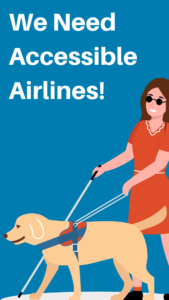Traveling while Blind: What Needs to Change?
by Beth
 How would an inclusive society differ from the one we’re living in now? Well, for one thing, an inclusive society would ensure people with disabilities have equitable access to four things other Americans may take for granted:
How would an inclusive society differ from the one we’re living in now? Well, for one thing, an inclusive society would ensure people with disabilities have equitable access to four things other Americans may take for granted:
- Education
- Employment
- Health care
- Transportation
Transportation has been high on my list of concerns lately. I just booked a flight to head out East with my Seeing Eye dog, Luna, to attend a memorial service for an old friend of ours.
Flying got easier for us a dozen years ago after lawmakers made revisions to stop people from passing their monkeys, parrots, rodents and reptiles off as “service animals” in order to bring them on board. Guide dogs are well-behaved, expertly-trained and intelligent, but let’s face it – monkeys, parrots, rodents and reptiles can be pretty distracting to a dog who is trying to guide their companion safely to a seat on an airplane.
Those changes in 2011 define a service animal as “any dog that is individually trained to do work or perform tasks for the benefit of an individual with a disability.” Notice the specific word “dog” in that sentence? According to law, other species of animals (whether wild or domestic, trained or untrained) are no longer permitted to accompany individuals onto planes. Ever since that law went into effect in 2011, getting on and off planes with my Seeing Eye dog has been a breeze.
But now they’ve changed the rules again. Now I have to fill out a form with the Department of Transportation anytime I fly with my Seeing Eye dog. The form asks for information about me, my email address, phone number, etc. It also asks for our veterinarian’s name and phone number, the school where the dog was trained, how much the dog weighs, and whether or not the dog is healthy.
And oh, did I mention that the paper form is not accessible? My sighted husband has to help me fill out the form each time we fly, and I’m required to carry that form with me on board.
Each airline seems to have a different method of processing the form. Some have never seen the DOT form before, some say they also need an ID number for my dog, some ask for an identification card, some ask for certification of a rabies vaccination.
So while people who can see simply show their boarding pass and saunter down the jetway, I’m left to supply forms, certificates, and ID cards before my Seeing Eye dog is allowed to guide me onto the plane.
Once we board, we’re supposed to keep our dog within our footprint. This was pretty easy to do with my previous guide dogs (you command “sit!” – then you command “Down!” and once they’re laying down, you maneuver their bottom under the seat in front of you and have them place their head between your feet). Luna is a small black labrador retriever (she weighs about 50 pounds), so she can fit there pretty easily. But as the space between airplane seats get smaller and smaller, many guide dogs will not be able to fit there anymore.
I flew a lot more often before COVID, and back then, flight attendants would regularly offer me bulkhead seats to accommodate my Seeing Eye dog. But I’ve heard from other friends who are blind that the bulkhead is now considered “premium economy” and you have to pay extra to sit there.
It just doesn’t seem fair. I hope the advocates and staff participating at the Easterseals Policy and Partnership Forum in Washington, D.C., might talk to members of Congress and encourage them to take another look at the Air Carrier Access Act. We can build an inclusive future by making it easier for people who are blind or low vision to travel on airplanes with their service dogs!







April 7th, 2023 at 6:38 am
I had no idea it took so much work to fly with a guide dog. I agree, we do need a more inclusive society, and people with disabilities need better and easier access to those four things. Very well written and well explained to those of us without guide dogs, and may not be as educated on these things.